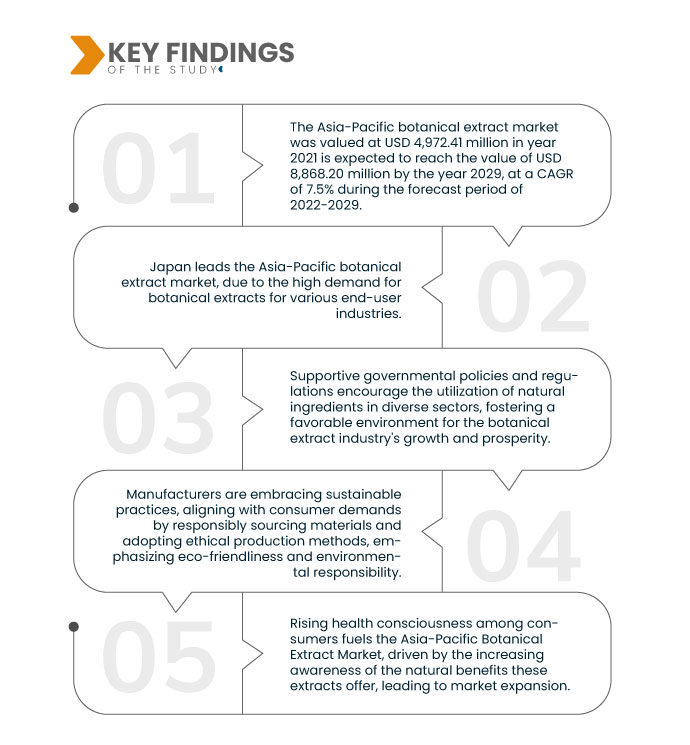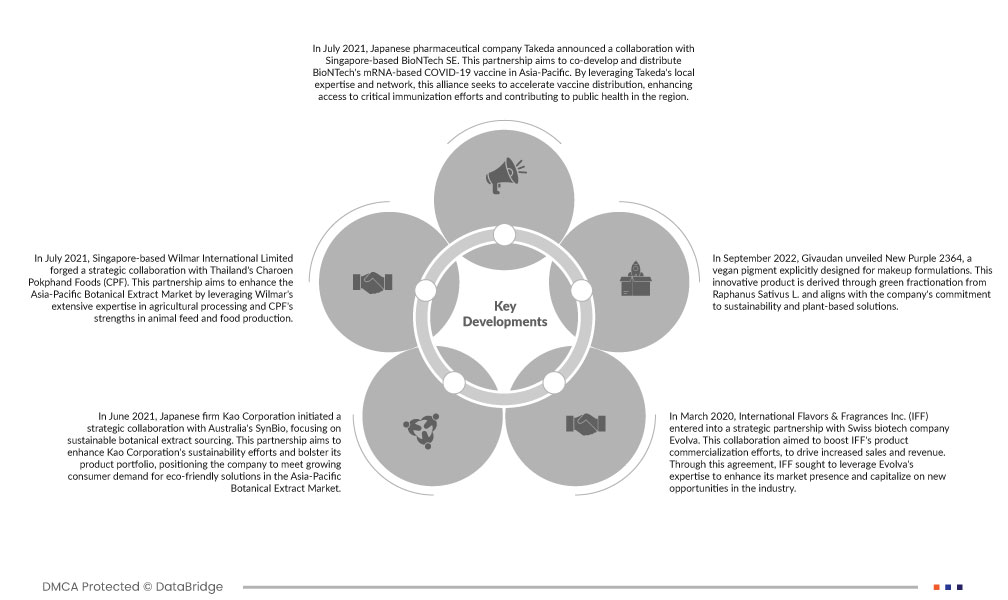Le marché des extraits botaniques de la région Asie-Pacifique connaît une croissance substantielle en raison de la sensibilisation croissante des consommateurs aux bienfaits des extraits botaniques pour la santé. Ces extraits sont dérivés de diverses plantes et herbes et sont utilisés dans un large éventail d'applications, notamment dans les aliments et les boissons, les produits pharmaceutiques, produits de beauté, et plus. L'expansion du marché est alimentée par la riche biodiversité de la région et la préférence croissante pour les produits naturels et végétaux. De plus, les efforts de recherche et développement visant à découvrir de nouvelles sources botaniques et techniques d’extraction stimulent l’innovation dans l’industrie. Alors que les consommateurs recherchent des options naturelles et durables, le marché des extraits botaniques de la région Asie-Pacifique est prêt à connaître une expansion continue.
Accéder au rapport complet @ https://www.databridgemarketresearch.com/reports/asia-pacific-botanical-extracts-market
Data Bridge Market Research analyse que le Marché des extraits botaniques en Asie-Pacifique était évalué à 4 972,41 millions USD en 2021 et devrait atteindre une valeur de 8 868,20 millions USD d'ici 2029, avec un TCAC de 7,5% au cours de la période de prévision 2022-2029. L’augmentation du revenu disponible dans les économies émergentes est un moteur important pour le marché des extraits botaniques de la région Asie-Pacifique. À mesure que les habitants des pays de la région Asie-Pacifique connaissent une augmentation de leurs revenus, ils disposent d’un plus grand pouvoir d’achat et sont enclins à privilégier des produits plus sains et de qualité supérieure. Cette tendance a entraîné une augmentation de la demande d’extraits botaniques, souvent associés à divers bienfaits pour la santé.
Principales conclusions de l'étude
La demande croissante de produits clean label devrait stimuler le taux de croissance du marché
Le marché des extraits botaniques de la région Asie-Pacifique connaît une augmentation de la demande de produits clean label. Les consommateurs recherchent de plus en plus d’ingrédients fonctionnels d’origine naturelle, ce qui entraîne le besoin d’offres clean label. Ce changement est étroitement lié à l’évolution des modes de vie des consommateurs, caractérisés par l’accent mis sur la santé et la conscience environnementale. Alors que les gens du monde entier accordent la priorité au bien-être et à la durabilité, les ingrédients naturels sont devenus un incontournable dans leurs choix quotidiens. De plus, les extraits botaniques se distinguent comme une option privilégiée, compte tenu de leur nature sans résidus chimiques, ce qui correspond parfaitement aux préférences des consommateurs végétaliens du marché.
Portée du rapport et segmentation du marché
|
Mesure du rapport
|
Détails
|
|
Période de prévision
|
2022 à 2029
|
|
Année de référence
|
2021
|
|
Années historiques
|
2020 (personnalisable jusqu'en 2014-2019)
|
|
Unités quantitatives
|
Chiffre d'affaires en millions USD, volumes en unités, prix en USD
|
|
Segments couverts
|
Type (extraits d'épices, extraits d'herbes, extraits de fleurs, extraits de thé, extraits de fruits et extraits de plantes marines), forme (liquide, poudre et extrait de feuilles), type de produit (biologique et conventionnel), application (nutraceutique, produits alimentaires, pharmaceutique , Soins personnels et cosmétiques, Boissons, Aromathérapie, Nutrition sportive, aliments pour animaux et autres).
|
|
Pays couverts
|
Japon, Chine, Corée du Sud, Inde, Thaïlande, Singapour, Indonésie, Malaisie, Philippines, Australie, Nouvelle-Zélande, Vietnam et reste de l'Asie-Pacifique.
|
|
Acteurs du marché couverts
|
Givaudan (Suisse), Kerry Group plc (Irlande), DSM (Pays-Bas), Sensient Technologies Corporation (États-Unis), Ingredion Incorporated (États-Unis), McCormick & Company, Inc. (États-Unis), Provital (Espagne), Martin Bauer Group (Allemagne ), Organic Herb Inc (Chine), Kalsec Inc. (États-Unis), Symrise (Allemagne), Synthite Industries Ltd. (Inde), International Flavors & Fragrances Inc. (États-Unis), Carrubba, Inc. (États-Unis), Blue Sky Botanics (Royaume-Uni), DÖHLER GmbH (Allemagne), Bio Botanica, Inc. (États-Unis), Bio-gen Extracts Private Limited (Inde), Plantnat (Chine), Native Extracts Pty Ltd. (Australie).
|
|
Points de données couverts dans le rapport
|
En plus des informations sur les scénarios de marché tels que la valeur du marché, le taux de croissance, la segmentation, la couverture géographique et les principaux acteurs, les rapports de marché organisés par Data Bridge Market Research comprennent également une analyse approfondie d'experts, une production géographiquement représentée par l'entreprise et capacité, configuration du réseau de distributeurs et de partenaires, analyse détaillée et mise à jour des tendances des prix et analyse des déficits de la chaîne d'approvisionnement et de la demande.
|
Analyse sectorielle :
Le marché des extraits botaniques de l’Asie-Pacifique est segmenté en quatre segments notables en fonction du type, de la forme, du type de produit et de l’application.
- Sur la base du type, le marché des extraits botaniques de l’Asie-Pacifique est segmenté en extraits d’épices, extraits d’herbes, extraits de fleurs, extraits de thé, extraits de fruits et extraits de plantes marines.
- Sur la base de sa forme, le marché des extraits botaniques de l’Asie-Pacifique est segmenté en extraits de poudre, liquides et de feuilles.
- Sur la base du type de produit, le marché des extraits botaniques de la région Asie-Pacifique est segmenté en produits biologiques et conventionnels.
- Sur la base des applications, le marché des extraits botaniques de la région Asie-Pacifique est segmenté en produits alimentaires, nutrition sportive, boissons, produits pharmaceutiques, nutraceutiques, soins personnels et cosmétiques. aromathérapie, l'alimentation animale, et d'autres.
Acteurs majeurs
Data Bridge Market Research reconnaît les sociétés suivantes comme les principaux acteurs du marché des extraits botaniques en Asie-Pacifique : Kerry Group plc (Irlande), DSM (Pays-Bas), Sensient Technologies Corporation (États-Unis), Ingredion Incorporated (États-Unis) , McCormick & Company, Inc. (États-Unis), Provital (Espagne), Martin Bauer Group (Allemagne), Organic Herb Inc (Chine), Kalsec Inc. (États-Unis), Symrise (Allemagne).
Développements du marché
- En juillet 2021, la société pharmaceutique japonaise Takeda a annoncé une collaboration avec BioNTech SE, basée à Singapour. Ce partenariat vise à co-développer et à distribuer le vaccin COVID-19 à base d'ARNm de BioNTech en Asie-Pacifique. En tirant parti de l'expertise et du réseau locaux de Takeda, cette alliance vise à accélérer la distribution des vaccins, à améliorer l'accès aux efforts de vaccination essentiels et à contribuer à la santé publique dans la région.
- En juillet 2021, Wilmar International Limited, basée à Singapour, a noué une collaboration stratégique avec la société thaïlandaise Charoen Pokphand Foods (CPF). Ce partenariat vise à améliorer le marché des extraits botaniques de l'Asie-Pacifique en tirant parti de la vaste expertise de Wilmar en matière de transformation agricole et des atouts de CPF en matière d'alimentation animale et de production alimentaire. La synergie devrait aboutir à une chaîne d’approvisionnement plus intégrée et durable, renforçant à terme la croissance et l’efficacité du marché.
- En juin 2021, la société japonaise Kao Corporation a lancé une collaboration stratégique avec la société australienne SynBio, axée sur l'approvisionnement durable en extraits botaniques. Ce partenariat vise à améliorer les efforts de Kao Corporation en matière de développement durable et à renforcer son portefeuille de produits, en la positionnant pour répondre à la demande croissante des consommateurs pour des solutions respectueuses de l'environnement sur le marché des extraits botaniques de l'Asie-Pacifique.
- En mars 2020, International Flavors & Fragrances Inc. (IFF) a conclu un partenariat stratégique avec la société de biotechnologie suisse Evolva. Cette collaboration visait à stimuler les efforts de commercialisation des produits d'IFF afin de générer une augmentation des ventes et des revenus. Grâce à cet accord, IFF cherchait à tirer parti de l'expertise d'Evolva pour renforcer sa présence sur le marché et capitaliser sur les nouvelles opportunités du secteur.
- En septembre 2022, Givaudan a dévoilé New Purple 2364, un pigment végétalien explicitement conçu pour les formulations de maquillage. Ce produit innovant est dérivé du fractionnement vert de Raphanus Sativus L. et s'aligne sur l'engagement de l'entreprise en faveur de la durabilité et des solutions à base de plantes. Son introduction enrichit la gamme de produits de Givaudan, répondant à la demande croissante d'ingrédients cosmétiques végétaliens et respectueux de l'environnement, renforçant la présence de l'entreprise sur le marché et répondant aux préférences changeantes des consommateurs soucieux de l'environnement.
Analyse régionale
Géographiquement, les pays couverts dans le rapport sur le marché des extraits botaniques de l’Asie-Pacifique sont le Japon, la Chine, la Corée du Sud, l’Inde, la Thaïlande, Singapour, l’Indonésie, la Malaisie, les Philippines, l’Australie, la Nouvelle-Zélande, le Vietnam et le reste de l’Asie-Pacifique.
Selon l’analyse de l’étude de marché Data Bridge :
Le Japon domine le marché dans Marché des extraits botaniques en Asie-Pacifique pendant la période de prévision 2022-2029
La domination du Japon sur le marché des extraits botaniques est attribuée à une forte demande dans diverses industries. La forte demande du pays pour ces extraits reflète leur rôle essentiel dans de nombreux secteurs, notamment l'alimentation, les cosmétiques, les produits pharmaceutiques, etc. La préférence des consommateurs japonais pour les produits naturels et axés sur le bien-être a amplifié cette demande. Les normes de qualité strictes et la réputation d'innovation du pays renforcent également sa position de leader, ce qui en fait un acteur essentiel sur le marché des extraits botaniques de l'Asie-Pacifique.
Pour des informations plus détaillées sur le Rapport sur le marché des extraits botaniques en Asie-Pacifique, cliquez ici –https://www.databridgemarketresearch.com/reports/asia-pacific-botanical-extracts-market














